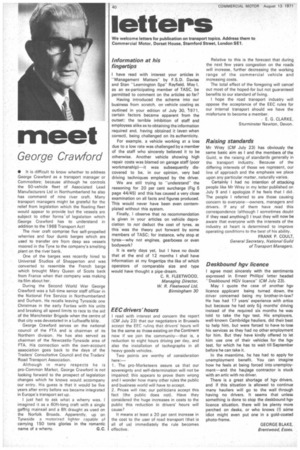letters
Page 42

If you've noticed an error in this article please click here to report it so we can fix it.
We welcome letters for publication on transport topics. Address them to Commercial Motor, Dorset House, Stamford Street, London SP.
Information at his fingertips
I have read with interest your articles in "Management Matters" by F.S.D. Davies and Stan "Leamington SeaRayfield. May I, as an ex-participating member of TASC, be permitted to comment on the articles so far?
Having introduced the scheme into our business from scratch, on vehicle costing as outlined in your edition of July 30, 1971, certain factors became apparent from the outset: the terrible inhibition of staff and employees alike as to obtaining the information required and, having obtained it (even when correct), being challenged on its authenticity.
For example, a vehicle working at a loss due to a low rate was challenged by a member of the staff who sincerely believed it to be otherwise. Another vehicle showing high repair costs was blamed on garage staff (poor workmanship)—it was subsequently discovered to be, in our opinion, very bad driving techniques employed by the driver.
We are still trying to "understandthe reasoning for 20 per cent surcharge (Fig 5 page 44/45) and this has caused a very close examination on all facts and figures produced. This would never have been even contemplated without this system.
Finally. I observe that no recommendation is given in your articles on vehicle depreciation to not deduct the cost of tyres, as this was the theory put forward by some members of TASC; for instance, why stop at tyres—why not engines, gearboxes or even bodywork?
It is early days yet, but I have no doubt that at the end of 12 months I shall have information at my fingertips the like of which operators of comparable size and type would have thought a pipe-dream.
C. R. FLEETWOOD, Managing Director, W. R. Fleetwood Ltd, Birmingham 30
EEC drivers' hours
I read with interest and concern the report (CM July 23) that our negotiators in Brussels accept the EEC ruling that drivers' hours will be the same as those existing on the Continent now if we join the community—that is, a reduction to eight hours driving per day, and also the installation of tachographs in all heavy goods vehicles, Two points are worthy of consideration here:— 1. The pro-Marketeers assure us that our sovereignty and self-determination will not be impaired; this appears to prove them wrong and I wonder how many other rules the public and business world will have to accept.
2. Prices will rise; our politicians accept this fact (the public does not). Have they considered the huge increases in costs to the public this reduction in drivers' hours will cause?
It means at least a 20 per cent increase in the cost to the user of road transport (that is all of us) immediately the rule becomes effective. Relative to this is the forecast that during the next few years congestion on the roads will increase, further decreasing the working range of the commercial vehicle and increasing costs.
The total effect of the foregoing will cancel out most of the hoped-for but not guaranteed benefits to our standard of living.
I hope the road transport industry will oppose the acceptance of the EEC rules for our internal transport should we have the misfortune to become a member.
E. G. CLARKE, Sturminster Newton, Devon.
Raising standards
Mr Wray (CM July 23) has obviously the same basic aim as I and the members of the Guild, le the raising of standards generally in the transport industry. Because of the differing interests of those we represent, our line of approach and the emphasis we place upon any particular matter, naturally varies. Certainly I had no intention of attacking people like Mr Wray in my letter published on July 9 and I apologize if he feels that I did. The people I referred to are those causing concern to everyone—owners, managers and drivers. If any of them have read this correspondence (although I sometimes doubt if they read anything!) l trust they will now be aware that everyone with the interests of the industry at heart is determined to improve operating conditions to the best of his ability. FRANK P. COULT, General Secretary, National Guild of Transport Managers,
Deskbound hgv licence
I agree most sincerely with the sentiments expressed in Ernest Phillips' letter headed "Deskbounci HGV licence(CM July 23).
May I quote the case of another hgv licence applicant being turned down, the driver concerned being my brother-in-law? He has had 17 years' experience with artics but because he had only 51months' driving instead of the required six months he was told to take the hgv test. His employers, well-known Cambridge hauliers, did their best to help him, but were forced to have to lose his services as they had no other employment for him. But they have kindly offered to let him use one ot their vehicles for the hgv test, for which he has to wait till September before he can take it.
In the meantime, he has had to apply for unemployment benefit. You can imagine how he feels at being forced into unemployment—and the haulage contractor is stuck with an artic with no driver.
There is a great shortage of hgv drivers, and if this situation is allowed to continue many hauliers will go to the wall through having no drivers. It seems that unless something is done to stop the deskbound hgv licence situation, there will be plenty more perched on desks, or who knows (I) same idiot might even put one in a gold-coated photo-frame, GEORGE BLAKE, Brentwood, Essex




















































































